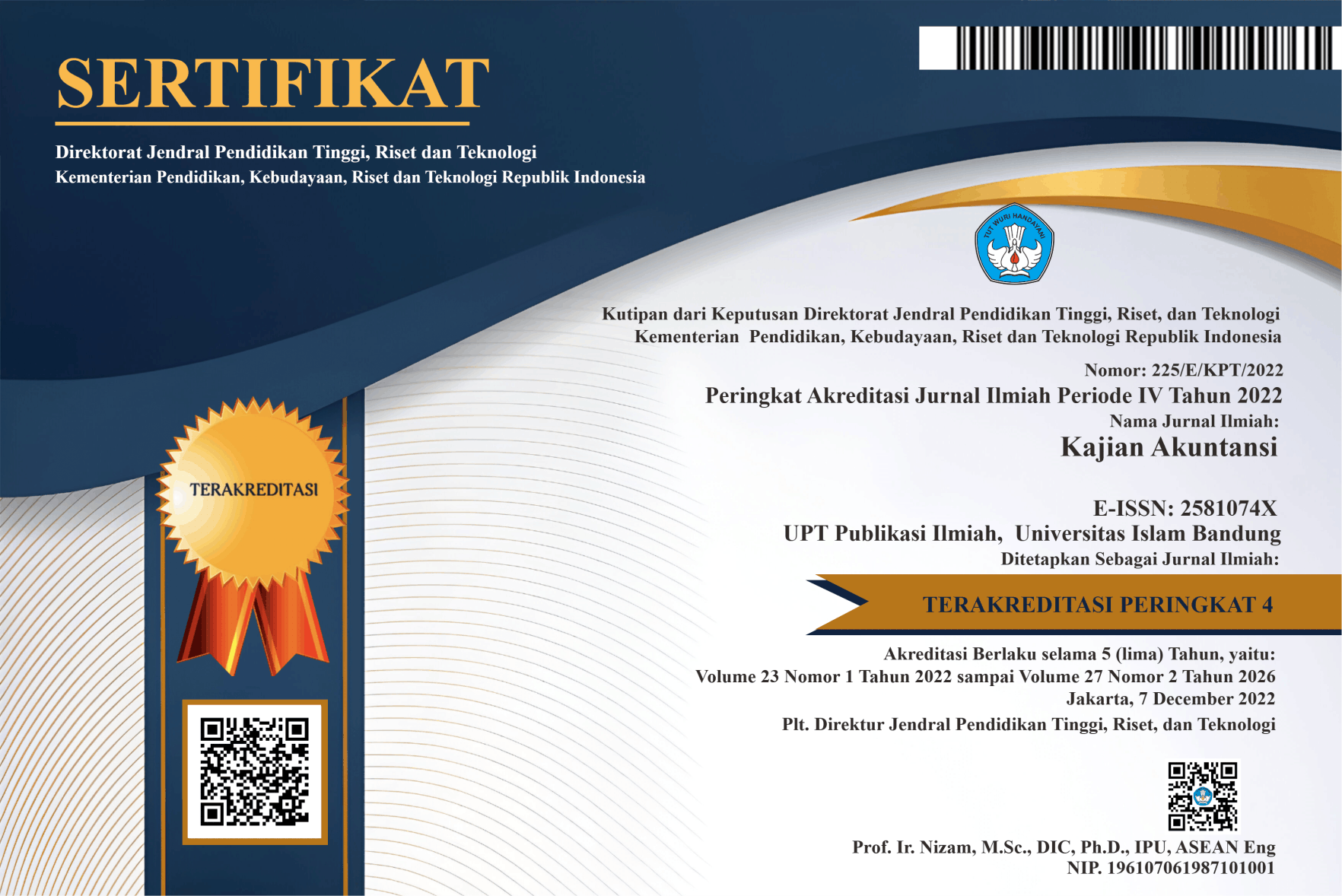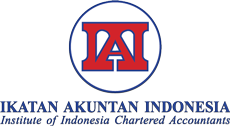DETERMINANTS OF AUDITOR’S ABILITY TO DETECT FRAUD
DOI:
https://doi.org/10.29313/kajian_akuntansi.v25i2.4610Keywords:
Ability to Detect Fraud, Professional Skepticism, Time Pressure, Work ExperienceAbstract
The study aims to provide empirical evidence on the effect of work experience, professional scepticism and time pressure on the ability of auditors to detect fraud. This research uses quantitative research methods that use statistical analysis tools, namely using Smart PLS (Partial Least Square) software. The data used is primary and comes directly from those surveyed, using a questionnaire designed to collect it. The questionnaires were distributed through the provision of paper questionnaires and through Google forms that were sent directly to the respondents. Sample in this study were 33 auditors in Medan City. The results of this study indicate that work experience positively affects the auditor's ability to detect fraud, while professional scepticism and time pressure do not affect the auditor's ability to detect fraud.
Keywords : Ability to Detect Fraud, Professional Skepticism, Time Pressure, Work Experience.
References
ACFE, A. of C. F. E. (2022). Occupational Fraud 2022: A Report to the nations. Association of Certified Fraud Examiners, 1–96.
Agustina, F., Nurkholis, N., & Rusydi, M. (2021). Auditors’ professional skepticism and fraud detection. International Journal of Research in Business and Social Science (2147- 4478), 10(4), 275–287. https://doi.org/10.20525/ijrbs.v10i4.1214.
Angelina, M., Modesta, A., & Ximenes, D. J. (2020). Pengaruh tekanan waktu dan skeptisism profesionalterhadap deteksi. 2020, 68–76.
Anggriawan, E. F. (2014). ‘Pengaruh Pengalaman Kerja, Skeptisme Profesional Dan Tekanan Waktu Terhadap Kemampuan Auditor’ in Mendeteksi Fraud (Studi Empiris Pada Kantor Akuntan Publik Di Diy). Nominal, Barometer Riset Akuntansi dan Manajemen, 3(2). https://doi.org/10.21831/nominal.v3i2.2697.
Ashton, Hubbard A. (1991). Experience and Error as Frequency Potential Audit Knowledge Determinants of Expertise. The Accounting Review, 66(2), 218–239.
Biki, R., & Ariawan. (2021). Pengaruh Skeptisme Profesional, Kompetensi Dan Beban Kerja Terhadap Kemampuan Auditor Dalam Mendeteksi Kecurangan. Journal of Management & Business, 5(2), 639– 655. https://doi.org/10.37531/sejaman.vxix.353.
Deliana, D., Rahman, A., Oktalia, R. R., Terapan, M., Informasi, S., Medan, P. N., & Utara, S. (2022). Fraud Detection Of Financial Statements With Diamond Fraud Analysis. Jurnal Aset (Akuntansi Riset), 14(1), 33–41.
Indrawati, L., Cahyono, D., & Maharani, A. (2019). Pengaruh Skeptisisme Profesional, Independensi Auditor dan Pelatihan Audit Kecurangan Terhadap Kemampuan Auditor dalam Mendeteksi Kecurangan. International Journal of Social Science and Business, 3(4), 393.
https://doi.org/10.23887/ijssb.v3i4.21496.
Indriyani, S., & Hakim, L. (2021). Pengaruh Pengalaman Audit, Skeptisme Profesional Dan Time Pressure Terhadap Kemampuan Auditor Mendeteksi Fraud. Jurnal Akuntansi dan Governance, 1(2), 113. https://doi.org/10.24853/jago.1.2.113-120.
Jensen, M. C., & Meckling, W. (1976). Racial diversity and its asymmetry within and across hierarchical levels: The effects on financial performance. Human Relations, 72(10), 1671–1696. https://doi.org/10.1177/0018726718812602.
Kassem, R., & Turksen, U. (2021). Role of public auditors in fraud detection: A critical review. Contemporary Studies in Economic and Financial Analysis, 105, 33–56. https://doi.org/10.1108/S1569- 375920200000105004.
Kertarajasa, A. Y., Marwa, T., & Wahyudi, T. (2019). The Effect of Competence, The Effect of Competence, Experience, Independence, Due Professional Care, And Auditor Integrity On Audit Qualitiy With Auditor Ethics As Moderating Variable. Journal of accounting finance and auditing studies (JAFAS), 5(1), 80–99. https://doi.org/10.32602/jafas.2019.4.
Kiswanto, & Maulana, P. A. (2019). Pengalaman Memoderasi Penilaian Risiko Kecurangan, Skeptisisme, Beban Kerja pada Kemampuan Mendeteksi Kecurangan. Jurnal Ilmiah Akuntansi dan Bisnis, 14(2), 183.
Larasati, D., & Puspitasari, W. (2019). Pengaruh Pengalaman, Independensi, Skeptisisme Profesional Auditor, Penerapan Etika, Dan Beban Kerja Terhadap Kemampuan Auditor Dalam Mendeteksi Kecurangan. Jurnal Akuntansi Trisakti, 6(1), 31–42. https://doi.org/10.25105/jat.v6i1.4845.
Maulidah, N., & Satyawan, M. D. (2021). Pengaruh tekanan waktu, pengalaman, kepribadian, dan skeptisisme profesional terhadap kemampuan auditor mendeteksi kecurangan. Jurnal Akuntansi, 9(1). https://doi.org/10.26460/ja.v9i1.2418.
Molina, & Wulandari, S. (2018). Jurnal Ilmu Akuntansi Akunnas. 16(2), 14–26.
Natalia, N. K. L., & Latrini, M. Y. (2021). Dampak Pengalaman, Skeptisisme Profesional, dan Kompetensi pada Kemampuan Auditor dalam Mendeteksi Kecurangan. E-Jurnal Akuntansi, 31(2), 349. https://doi.org/10.24843/eja.2021.v31.i02.p07
Ningtyas, I., Delamat, H., & Yuniartie, E. (2019). Pengaruh Pengalaman, Keahlian, dan Skeptisisme Profesional Terhadap Pendeteksian Kecurangan (Studi Empiris Pada Bpk Ri Perwakilan Sumatera Selatan). AKUNTABILITAS: Jurnal Penelitian dan Pengembangan Akuntansi, 12(2), 113–124. https://doi.org/10.29259/ja.v12i2.9312
Permana, Y., & Eftarina, M. (2020). Peran Whistleblowing System dalam Memoderasi Pengaruh Skeptisisme Professional Terhadap Kemampuan Auditor Dalam Mendeteksi Kecurangan. Prosiding Seminar Nasional Pakar, 2015, 2014–2019. https://doi.org/10.25105/pakar.v0i0.6836
Permatasari, luh wulan. (2022). Pengaruh Independensi Dan Skeptisme Profesional Terhadap Kemampuan Auditor Mendeteksi Fraud. Jurnal Ilmiah Akuntansi dan Keuangan, 4(3), 1–14.
Piserah, M., Sutjipto, V. F., Firmansyah, A., & Trisnawati, E. (2022). Perilaku Fraud Detection Pada Auditor: Professional Skepticism, Whistleblowing, Integritas, Time Pressure. Jurnal Ilmiah Akuntansi Kesatuan, 10(1), 17–28. https://doi.org/10.37641/jiakes.v10i1.1185
Prakoso, R. T., & Zulfikar. (2018). Pengaruh Skeptisisme Profesional, Pengalaman, Kompetensi, Profesionalisme dan Tekanan Waktu terhadap Kemampuan Auditor Mendeteksi Kecurangan ( Studi pada Kantor Badan Pengawas Keuangan dan Pembangunan Yogyakarta ). Publikasi Ilmiah, 1–10.
Pratiwi, W., Rizal, N., Indrianasari, N. T., Wiyono, M. W., & Ifa, K. (2019). Auditor competence, auditor independence, auditor experience, audit fees and time budget pressure against fraud detection. Journal of Advanced Research in Dynamical and Control Systems, 11(12), 26–33. https://doi.org/10.5373/JARDCS/V11I12/20193208
Priyo. (2018). Konsep Auditing System dalam Penjaminan Mutu Pendidikan Islam. Konsep Auditing System Dalam Penjaminan Mutu Pendidikan Islam, 06(1), 17–28.
Putri, K. M. D., Wirama, D. G., & Sudana, I. P. (2017). Pengaruh Fraud Audit Training, Skeptisisme Profesional, Dan Audit Tenure Pada Kemampuan Auditor Dalam Mendeteksi Kecurangan. E-Jurnal Ekonomi dan Bisnis Universitas Udayana, 11, 3795. https://doi.org/10.24843/eeb.2017.v06.i11.p03
Rafnes, M., & Primasari, nora hilmia. (2020). Pengaruh Skeptisisme Profesional, Pengalaman Auditor, Kompentensi Auditor dan Beban Kerja terhadap Pendeteksian Kecurangan. Jurnal Akuntansi dan Keuangan, 9(1), 16–31. https://journal.budiluhur.ac.id/index.php/akeu/article/view/1410
Rizky, M. A., & Wibowo, D. (2019). Pengaruh Kompetensi, Independensi, Skeptisme Dan Pelatihan Auditor Terhadap Kemampuan Mendeteksi Kecurangan. Jurnal Ilmu dan Riset Akuntansi, 8(12), 1–15.
Sari, Y. E., & Helmayunita, N. (2018). Pengaruh Beban Kerja, Pengalaman, dan Skeptisme Profesional Terhadap Kemampuan Auditor Dalam Mendeteksi Kecurangan (Studi Empiris pada BPK RI Perwakilan Propinsi Sumatera Barat). Wahana Riset Akuntansi, 6(1), 1173. https://doi.org/10.24036/wra.v6i1.101940
Sofie, S., & Nugroho, N. A. (2019). Pengaruh Skeptisme Profesional, Independensi, Dan Tekanan Waktu Terhadap Kemampuan Auditor Mendeteksi Kecurangan. Jurnal Akuntansi Trisakti, 5(1), 65–80. https://doi.org/10.25105/jat.v5i1.4844
Subiyanto, B., Digdowiseiso, K., & Mandasari, N. (2022). Pengaruh Pengalaman Kerja, Skeptisme Profesional, Dan Tipe Kepribadian Terhadap Kemampuan Auditor Dalam Pengungkapan Kecurangan (Fraud). Fair Value: Jurnal Ilmiah Akuntansi dan Keuangan, 4(6), 2609–2620. https://doi.org/10.32670/fairvalue.v4i6.1152
Sugiyono. (2021). Metode Penelitian Kuantitatif Kualitatif dan R&D (Sutopo (ed.); kedua). Alfabeta. Sumanto, A., & Ismangil. (2021). Analisa Faktor-Faktor Yang Mempengaruhi Penghentian Prematur Atas
Prosedur Audit (Studi Empiris Pada Akuntan Publik Di Surabaya). Equilibrium, Volume 9, Nomor 2, Oktober 2011, hlm. 107-124 terutama.
Suraida, I. (2005). Pengaruh Etika, Kompetensi, Pengalaman Audit Dan Risiko Audit Terhadap Skeptisme Profesional Auditor Dan Ketepatan Pemberian Opini Akuntan Publik. Sosiohumaniora, 07, 186–202.
Syamsuri, R., Muslim, M., & Asbi, A. (2019). Red Flag And Auditor Experience Toward Criminal Detection Trough Profesional Skepticism. Jurnal Akuntansi, 23(1), 46. https://doi.org/10.24912/ja.v23i1.459.















